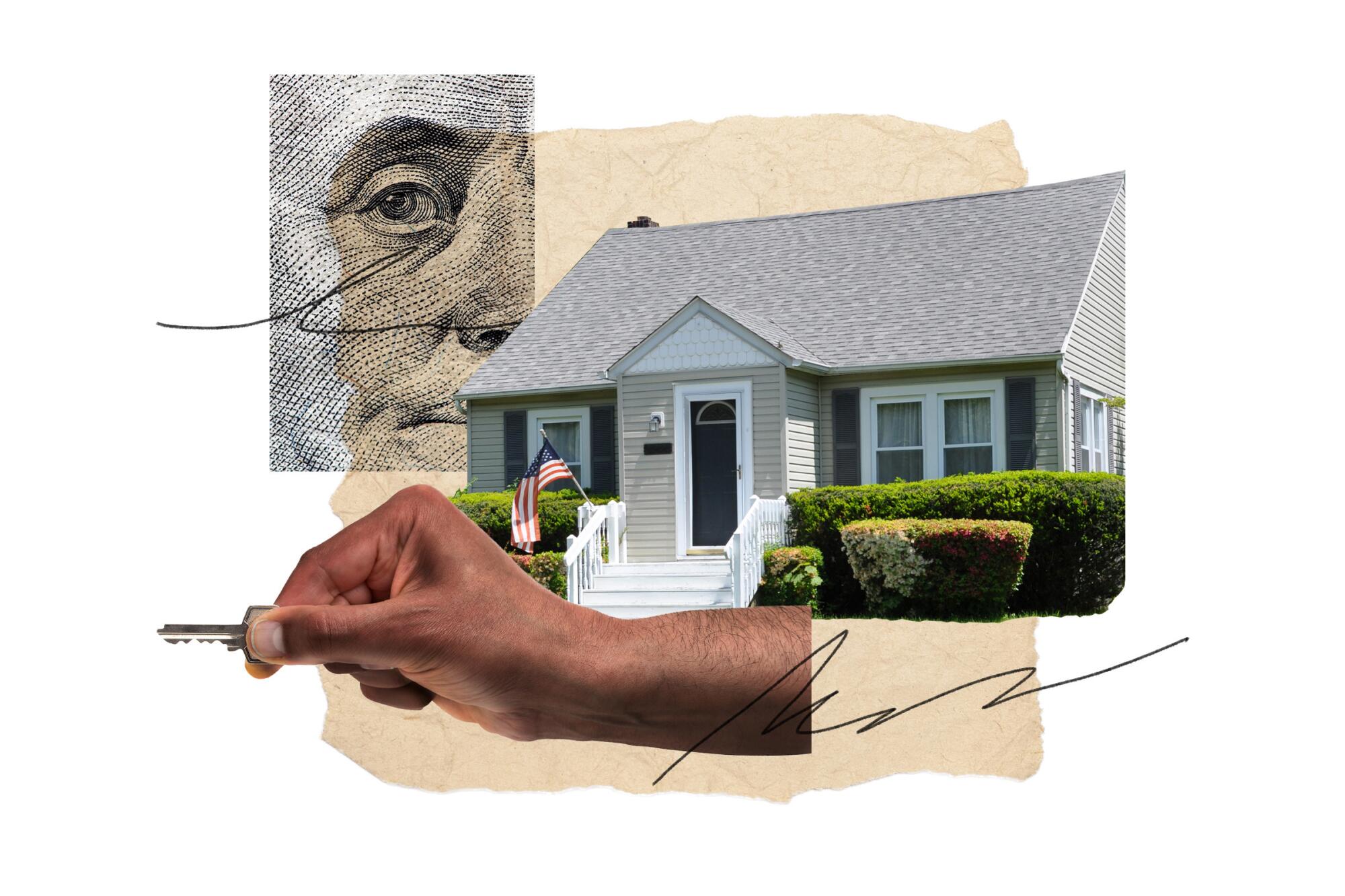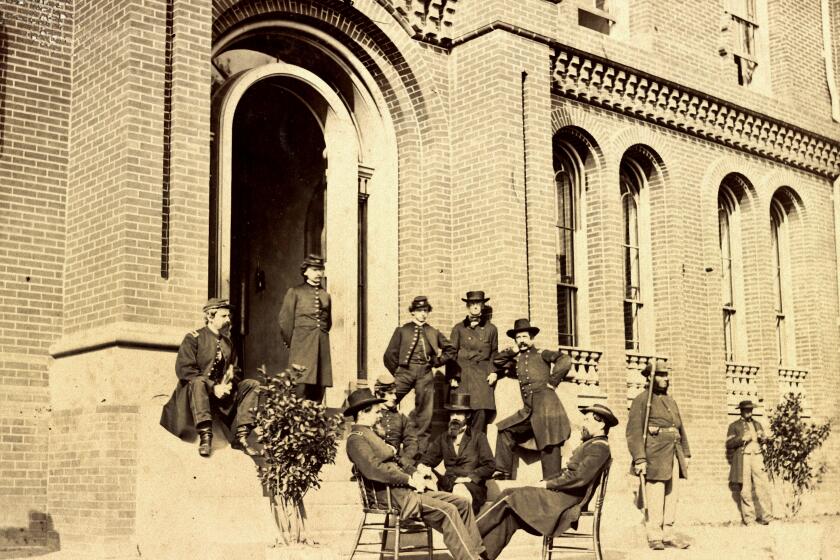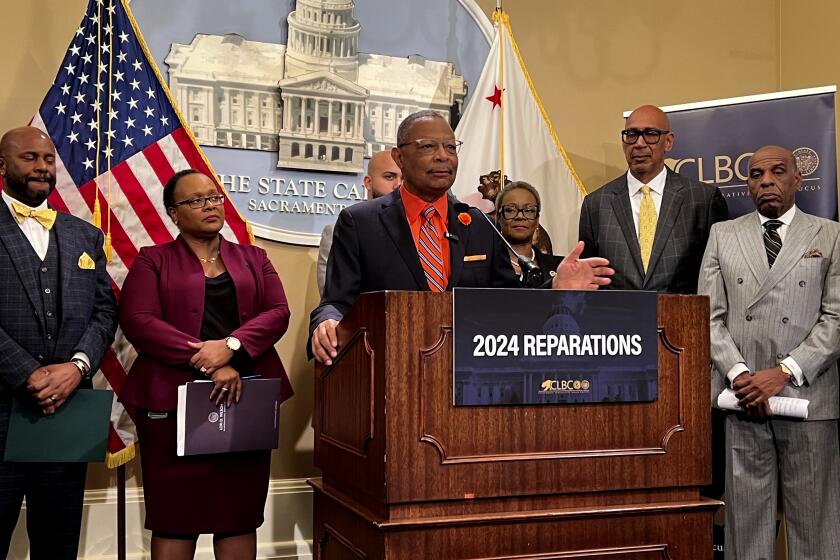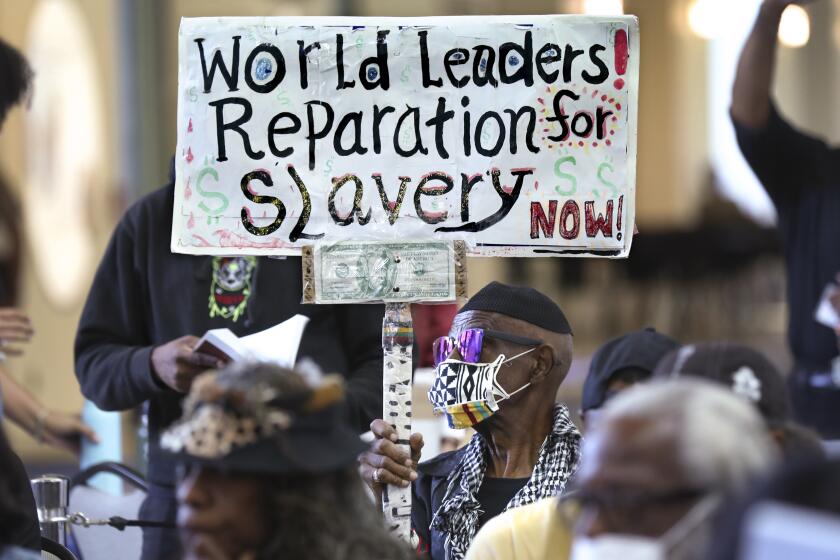
- Share via
At a time when it was extremely difficult for Black families to purchase homes and utilize government benefits, my grandfather accomplished an almost impossible feat: He used the GI Bill after World War II and bought a house.
For three years, I’ve researched the Black-white wealth gap. In interviews with Black families, I learned that discrimination prevented their relatives from using the GI Bill.
An Episcopal seminary in Alexandria, Va., is paying reparations for using slave labor and unpaid labor, even after Emancipation. But can you put a price on justice?
My family’s rare story of homeownership when most Black families were unable to buy houses shows us that — without discrimination — more Black families could have become homeowners, and leveraged that wealth into funding education, businesses and other upward economic moves. Yet even for those like my family who had access to some governmental programs, economic options were limited because of discriminatory laws and racism, forcing people like my grandparents into neighborhoods restricted to or built for Black residents.
The GI Bill could have helped Black Americans gain wealth, as the legislation did for white Americans. Instead, Black Americans were largely left out and the GI Bill widened the Black-white wealth gap. Now as the debate over reparations and other initiatives to address past inequities grows, this history of missed opportunities underscores why all Black American families should be eligible for any socioeconomic programs, beyond just the GI Bill, at the state and federal levels.
Can we really trace the problems of Black homelessness and poverty back to slavery? A UC San Francisco study says yes, and it’s time we listen.
The federal government created the GI Bill program in the summer of 1944 to assist veterans, regardless of race, with loans for education, job training, homeownership and businesses. The loans were administered at the state and municipal levels. Those with local power decided who got the loans or not. Bias and discrimination crept in.
More than 1 million Black Americans served in World War II. There is no definitive data on how many Black Americans were barred from using the GI Bill. Scholars studying that period say very few were actually able to take advantage of it.
Most California voters possess a more nuanced view on the lasting legacy of slavery and how the state should address those wrongs. Still, there is overwhelming opposition to cash reparations.
In one of my interviews, a woman said that her father tried to use the GI Bill in New York, after serving in the Navy from 1955 to 1959. A banker told him he couldn’t use the bill because many homes had deeds or restrictive covenants that wouldn’t allow Black families to buy them, she said. In another example, the family of William Alexander Scott III, who’d been a sergeant during World War II, said Scott had hoped to use the GI Bill to attend Georgia Tech. But the school turned him down because he was Black, according to his writings in an old notebook.
Louis Lee Woods II, a history professor at Middle Tennessee State University, has researched the GI Bill and calculated that it could have created 400,000 Black homeowners in our economy.
Santa Monica is exploring what to compensate the descendants of Silas White, a Black businessman whose land was seized by eminent domain before he could open a beach club.
Of the estimated 1,154,486 African American veterans from World War II, fewer than 30,000, or 2.6%, “ever benefited from the homeownership provisions of the GI Bill,” Woods wrote in a paper.
Today, the Black homeownership rate is around 45%, and for white Americans it’s at 75%. In Los Angeles, the white homeownership rate is double the rate for Black families.
My family’s experience reflects what could have been. My grandfather was drafted around age 18, his draft service card shows. Neither he nor my grandmother finished college, and he became disabled in the war. The GI Bill enabled him to purchase a home in 1954.
My family isn’t sure how he was able to access the GI Bill or how he overcame obstacles that other Black families faced. We do know that there were few safe places that welcomed Black homeowners. But my grandparents — Robert and Bessie — discovered a haven in suburban Newburg, Ky., which had been founded by Eliza Tevis, a formerly enslaved woman. So, Robert used the GI Bill and purchased their home for $9,000. It was a brand new home with a light-colored stone front exterior, 1,000 square feet, three bedrooms, one bath and a basement.
My grandparents had six children there. Bessie stayed mostly at home, honing her excellent homemaking skills — sewing, cooking, tending to the children — but occasionally took up small odd jobs. She obtained her cosmetology training at one of Madam C.J. Walker’s beauty schools and later her GED. Robert worked at the Celanese Corp.
The equity from Robert and Bessie’s house helped pay for my aunt’s first year in college. After my grandfather died in 1984, Bessie continued to live in the home, which by then was paid off, until she sold it for around $80,000 in 2009. She used the money from that sale to purchase a condo closer to family.
Despite the advantages the house provided us, it would be difficult to find very many other families like mine. The GI Bill also did not shield us from the pervasiveness of discrimination. America has already limited economic prosperity for Black Americans. It is time to reverse that.
Reparations tied to the GI Bill have been proposed in Washington in several Congressional cycles. Wherever you stand on the issue of reparations, when you meet people like me — a successful professional whose grandfather used the GI Bill — keep in mind that I am the exception. In reality, 97% of Black American World War II veterans were not able to use the GI Bill.
Both Robert’s and Bessie’s parents also owned homes (though my family isn’t certain how my great-grandparents afforded them). That makes me a fourth-generation Black female property owner in the United States. That simple statement, I have learned, is anything but simple or easy. It’s nearly a miracle.
Ebony Reed, a journalist and media executive, is co-author with Louise Story of the new book, “Fifteen Cents on the Dollar: How Americans Made the Black-White Wealth Gap.” She is the chief strategy officer at The Marshall Project and she teaches an MBA class about racial wealth gaps at the Yale School of Management.
More to Read
A cure for the common opinion
Get thought-provoking perspectives with our weekly newsletter.
You may occasionally receive promotional content from the Los Angeles Times.










